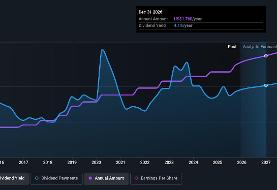Girls' early puberty in Iran and the world: Healthy or not?

Iranian girls are reaching maturity/puberty at a younger age. Research shows that Iranian girls born between 1976 and 1985 on average reach the menstruation age at 13.5 years, which is more than a year younger than of their mother or grandmother's generation, those born between 1936-1945. In Europe and America, the trend is even more prominent. The western average for menstruation is about 12.7 years. National trends show American girls are now maturing at an unprecedented age, some (15% according to a 2011 study in the journal of Pediatrics) as early as 7! According to to a recent article "Puberty Before Age 10: A New ‘Normal’?" published in New York Times, the average age of breast budding has fallen significantly since the 1970s. In England, one report indicates "Shocked doctors blame hormones in food and water for some British toddlers (three years old!) showing signs of breast growth. Other pre-school youngsters even experience periods that normally start in their teens – and have temper tantrums just like adolescents."
Is this early puberty healthy or not?

Early puberty is believed to put girls at higher risk of sexual abuse, teasing or bullying, depression, and a great risk for breast cancer later in life. The early growth spurt can retard fuller growth in adolescence, as the brain tells the bones that growing time is over. Research data indicates that "if you get your first period before age 12, your risk of breast cancer is 50 percent higher than if you get it at age 16... For every year we could delay a girl's first menstrual period, we could prevent thousands of breast cancers."
But early puberty also has other costs: Mental, cerebral, psychological and spiritual - All related to brain development. If the average girl is "physically" developing earlier, is her "brain" keeping up with her body and able to handle the changes that go with a changing body? According to Dr. Giedd, a neuroscientist at the National Institute of Mental Health, at least the prefrontal cortex, the part of brain involved in planning, organizing and modulating moods, cannot keep up with early puberty because it experiences slow steady growth and is one of the last parts of the brain to develop and change throughout adolescence. So this "Manager" part of the brain takes its time to develop regardless of physical maturity and early puberty. This means children reaching early puberty will be mentally and socially "out of place." Girls under age 10 aren't mentally prepared for monthly periods. Also, because they appear older than their peers, pubescent children face increased social pressure to conform to adult norms; society may view them as more emotionally advanced, despite the fact that their cognitive and social development may lag behind their appearance. As a result, early puberty exposes children to an increased risk of mental health disorders such as depression and binge eating.
What is causing earlier puberty in girls?
Girls who have a high-fat or high animal-protein diet are more likely to physically mature earlier. There is theoretical concern, and animal evidence, that environmental hormones (such as those used in non-organic beef, milk or pharmaceuticals) and chemicals may affect puberty. Exposure to chemicals (such as Bisphenol A in some plastics) that mimic estrogen (known as xenoestrogens) are also possibles cause of early puberty in girls. Researchers also have hypothesized that early puberty onset may be caused by certain hair care products containing estrogen or placenta, and by certain chemicals, namely phthalates, which are used in Vinyl plastics and many cosmetics, toys, and plastic food containers.
More than a decade ago, Roy Hertz, then director of endocrinology at the National Cancer Institute and a leading authority on hormonal cancers, warned of the carcinogenic risks of estrogenic additives which can cause imbalances and increases in natural hormone levels. Hormones are banned by the European Union in cattle farming. In 1996 the European Union banned the import of Canada and US meat that contained artificial beef hormones. This led to a "beef" trade war between Europe and America which was taken to the WTO. In 2003 the European Commission published new research results showing hormones used in treating cattle remain in the tissue, specifically the hormone, 17-beta estradiol. The Commission also found high amounts of hormones in areas where there are dense cattle lots. This increase in hormones in the water has affected waterways and nearby wild fish.

In 1996, the famed American TV host Oprah Winfrey was sued for $11 million by a group of Texas cattle ranchers for an episode of her programme devoted to problems with American beef. Jury ruled in favor of Oprah and freedom of speech.















































